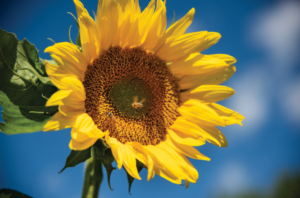
Happy Pollinator Week! This week, we not only celebrate our honey bees and the sweet honey they provide to us, but we also salute the hard work of other pollinators including butterflies, birds, bats, beetles, and more!
A pollinator is an animal or insect that helps plants to make fruit or seeds. Pollination happens by moving pollen from one part of the flower of a plant to another part to fertilize the plant. Seventy-five percent of the world’s food crops rely on pollinators, which underlines how important they are to people and our planet.
At the National Honey Board (NHB), we believe knowledge is power when it comes to helping bees thrive, which is why we fund research that takes a deep look at bee health. We want to support our beekeepers, who are using science to help grow and preserve bee populations so we can continue to enjoy the fruits -- or honeys -- of their labor.
In a recent study funded by the NHB, scientists focused on using eco-friendly methods to keep the honey flowing. They have discovered that spraying hives with a mixture of bee pheromones can encourage the bees’ natural hygienic behavior. This means that healthy bees are able to detect and remove other bees that have been affected by disease, such as the Varroa mite. The isolation of unhealthy bees helps to keep healthy hives flourishing. This can help beekeepers breed healthy bees that are able to detect this chemical change through their nervous systems.
Just as in people, diet can play a major role in bees’ health and wellbeing. Scientists are exploring ways to improve nutrition for bees, with the goal of increasing honey production. For example, research by entomologists has found that a type of microalgae called Arthrospira platensis (also known as spirulina), has a nutritional content that is very similar to pollen. These microalgae can serve as a supplemental food source for honey bees due to its nutritional benefits. Now, scientists are studying whether it is attractive to bees. Research suggests there may be other microalgae that could be utilized, as well, and further testing is underway.
Science is a magnificent tool for creating sustainable solutions to nurture and protect our honey bees – the more we learn and invest in preserving them, the better bees, people and the planet will be.
